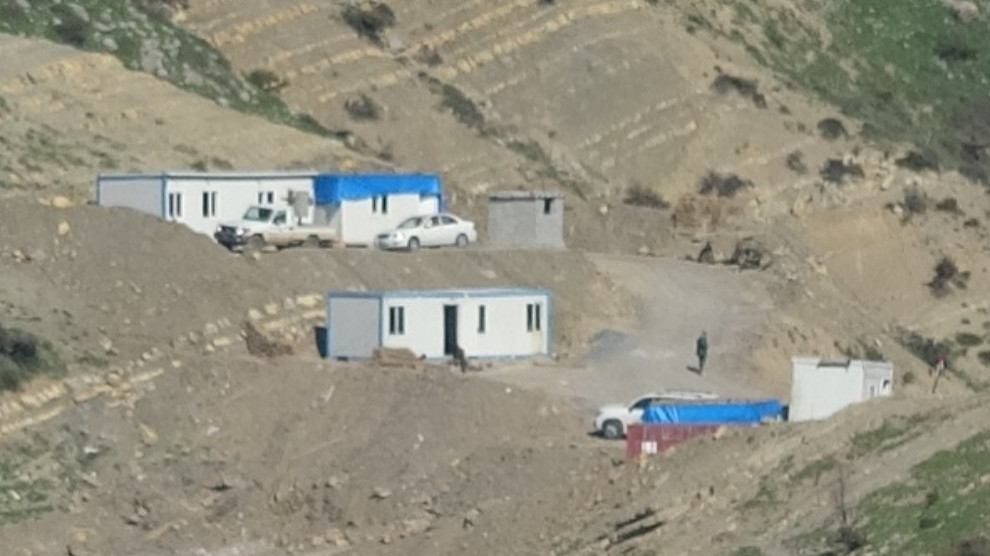Hundreds of women write to South Kurdistan leaders
Hundreds of women sent an open letter to all political parties, institutions and organisations in South Kurdistan saying: "Kurdistan should not become a battleground for regional or global wars."
Hundreds of women sent an open letter to all political parties, institutions and organisations in South Kurdistan saying: "Kurdistan should not become a battleground for regional or global wars."

Hundreds of women sent an open letter to Mr. Masoud Barzani, President of the Kurdistan Democratic Party (KDP); Ms. Bese Hozat and Mr. Cemil Bayik, Co-Chairs of the Executive Council of the Kurdistan Communities Union (KCK); Mr. Lahur Talabani and Mr. Bafel Talabani, Co-Presidents of the Patriotic Union of Kurdistan (PUK).
The letter said that "Kurdistan should not become a battleground for regional or global wars. It should be an inspiration for democracy and peaceful coexistence in the Middle East."
The letter has been sent also to UN Secretary-General, Mr. António Guterres; Secretary General of the Council of Europe, Mrs. Marija Pejčinović Burić; President of the European Commission, Dr. Ursula von der Leyen; Secretary General of the NATO, Mr. Jens Stoltenberg; President of the United States of America, Mr. Donald Trump; President of the Russian Federation, Mr. Vladimir Putin; President of the Republic of Iraq, Dr. Barham Salih.
The letter added: "In the shadow of the deadly worldwide pandemic, while much of humanity is occupied with protecting itself against COVID-19, some states are taking the opportunity to continue and even intensify their militarist, aggressive and occupation policies. Despite the ongoing global health crisis, violent struggles for hegemony continue in Kurdistan and the rest of the Middle East."
The letter continued: "During the past century, Kurdistan’s geostrategic location, across four key occupying states, has turned it into a systematic battlefield. Turkey, Iran, Iraq, and Syria have all shared a policy of totally denying Kurdish identity, even as the international organisations and institutions have refused to extend legal, political, and diplomatic recognition of the Kurdish right to self-determination. As a result, Kurds have countless times become victims of crimes against humanity and war crimes. Parallel to this genocide, states have implemented feminicide as a special form of warfare against Kurdish women.
States attempting to implement their regional and global colonial policies have always used, as their dirtiest and most brutal tool, the exploitation of differences among those they wish to dominate; they have exploited internal disputes in order to divide and rule. The Turkish state, especially, insists on trying to weaken the Kurds, as it has done in the past, by stirring up internal Kurdish conflicts in Rojava and in Iraq’s Kurdistan Region, in a divide-and-rule-and-eliminate policy."
The women reminded that "the Turkish state is now preparing to launch a major military offensive in the region of Zini Werte, close to the Qandil mountains in southern Kurdistan (northern Iraq), located 40-50 kilometres from the Iranian border. As part of its preparation, it is putting pressure on local Kurdish political forces to deploy Kurdish forces there, as proxies. The Turkish state believes it can incite Kurds to fight Kurds, with the further goals of weakening and destabilising Kurdish political institutions and ultimately occupying ever more of Kurdistan."
The current dispute in Zini Werte is not an isolated problem, said the letter, adding that "rather, it is one of many conflicts that could easily escalate and provoke bloodshed, especially if the United States, Iraq and NATO grant the Turkish military a free hand. It is not solely an internal Kurdish matter."
The letter continued: "We believe that unity among your parties and movements in defence of Zini Werte and Qandil would not only benefit the Kurdish people but would also constitute a vital contribution to peace in the region. Furthermore, we believe that addressing the Kurdish Question is inextricably linked to promoting a democratic transformation of the Middle East. Achieving a just and peaceful resolution to this issue could support democratisation in the wider region. We must not underestimate the potential impact of the Kurdish perspective on democracy and peaceful coexistence in the Middle East. It could contribute vitally to effecting and preserving democratisation in the key states of Turkey, Iran, Iraq and Syria."
The letter also reminded that "since its foundation, the Kurdistan Regional Government (KRG) of Iraq, a constitutional and internationally recognised Kurdish governmental entity, has been a thorn in the side of the Turkish state, which seeks to crush any and all national aspirations of the Kurdish people. Turkish state regards any destabilisation or weakening of the KRG as a victory. The KRG, Iraq’s safest area, has been an important achievement for all Kurds, and we must work together to protect it through Kurdish national unity."
The women ended the letter by saying: "We see it as our duty to prevent war and defend peace and coexistence anywhere in the world. Finally we urge you: “Kurdistan should not become a battleground for regional or global wars. It should be an inspiration for democracy and peaceful coexistence in the Middle East."
The letter is signed, among other by: Commission on Women of the Kurdistan National Congress (KNK), Shirin Ebadi, Nobel Peace Laureate, Ela Gandhi, Chairperson Gandhi Development Trust and Phoenix Settlement Trust, South Africa, Malin Björk, Member oft he European Parliament (MEP), The Left Party Sweden, Silvia Modig, MEP, Vasemmistoliitto (The Left Alliance), Finland, María Eugenia Rodríguez Palop, MEP, Podemos Spain, Leïla Chaibi, MEP, La France Insoumise (FI), France, Martina Michels, Die Linke, Germany, Baroness Helena Kennedy QC, House of Lords, UK, Baroness Jenny Jones, House of Lords, UK, Margaret Owen, Director Widows for Peace Through Democracy, UK, Julie Ward, Former MEP 2014 – 20, UK, Maxine Peake, Actress and Writer, UK, Janet Biel, American Political Writer, USA, Debbie Bookchin, Journalist, USA, Barbara Spinelli, Italy, Bologna, lawyer, member of the executive board of ELDH (European Lawyers for Democracy and Human Rights), Lilian Galán, MP of The Broad Front (Frente Amplió) Uruguay, Veronica Matto, MP of The Broad Front (Frente Amplió) Uruguay
RELATED NEWS: